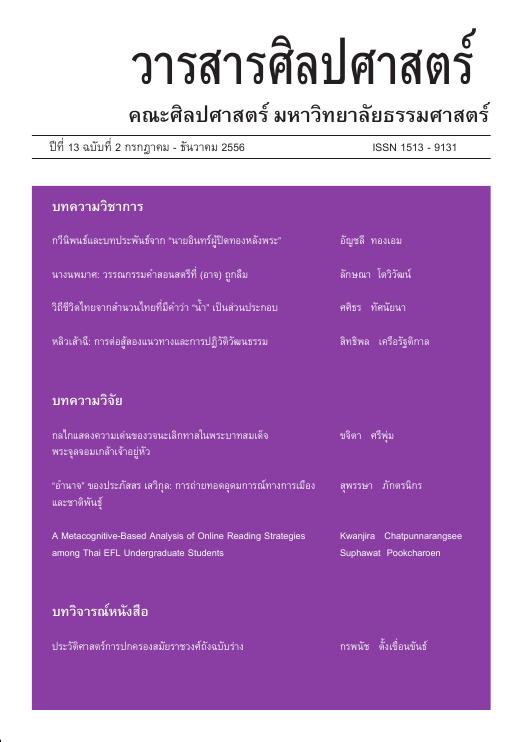"อำนาจ" ของประภัสสร เสวิกุล: การถ่ายทอดอุดมการณ์ทางการเมืองและชาติพันธุ์
Main Article Content
บทคัดย่อ
บทความนี้มุ่งศึกษานวนิยายเรื่อง อํานาจ ของประภัสสร เสวิกุล ในแง่ของอุดมการณ์ สังคมที่แฝงเร้นอยู่ในโครงสร้างการเล่าเรื่องโดยใช้วิธีศึกษาตามแนวสัญศาสตร์ ศาสตร์แห่งเรื่องเล่า และใช้แนวคิดอุดมการณ์ของหลุยส์ อัลธูแซร์ ผลการศึกษาพบว่านวนิยายเรื่อง อํานาจ มีโครงสร้างการเล่าเรื่องทีมีศักยภาพในการผลิตสร้างหรือตอกย้ำอุดมการณ์ของรัฐแบบชนชั้นกลาง คือ อุดมการณ์การยกย่องระบอบประชาธิปไตย ต่อต้านระบอบเผด็จการ และสื่อนัยยะทางชาติพันธุ์ว่า ชาติพันธุ์ไทยมีความสูงส่งกว่าละตินอเมริกา อุดมการณ์เหล่านี้ยังถูกทำให้เป็นกระแสหลักในสังคมด้วยการยกย่องนวนิยายเรื่อง อํานาจ ให้เป็น “หนังสือดี” จากงานสัปดาห์หนังสือแห่งชาติประจําปีพ.ศ. 2526 และได้รับการยกย่องให้เป็นหนังสือดีสําหรับเด็กและเยาวชนจากสมาพันธ์เพื่อพัฒนาหนังสือและการอ่านปีพ.ศ. 2541-2542 ทําให้รัฐแบบชนชั้นกลางสามารถธํารงรักษาอํานาจทางการเมืองไว้ได้
This article aims at studying “Aumnat”, the novel by PrabhassornSevikul, focusing on social ideology embedded in the narrative structure through the frameworks of semiotics, narratology, and Louis Althusser’s ideology. The results revealed that “Aumnat” has the potential to both produce and reinforce ideologies of the middle class state through the portrayals of the stout support for democracy, condemnation of dictatorship, and connotatively indicating that the Thai race is superior to Latin American. More importantly, the ideologies that appear in this novel have been integrated into the Thai social mainstream through the promotion of the book as an “outstanding” achievement during The Bangkok Book Fair in 1983 and as one of 100 ‘must-read’ young adult literature from The Association of Book and Reading Development in 1998-1999, allowing the Thai middle class state to maintain its political authority.


